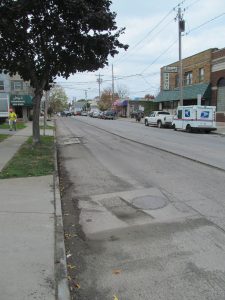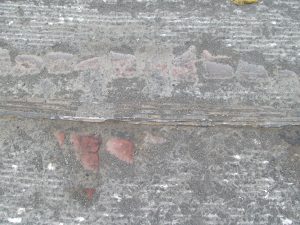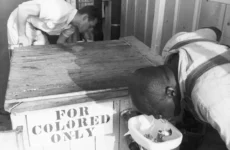
The standard practice of only 2 inches of milling and repaving in the city of Niagara Falls, such as is taking place on Buffalo Avenue, usually results in the blacktop cracking and potholes developing within just a few years, due to the brutally cold winters here.
A local contractor in the process of repaving a section of Buffalo Avenue in the city, abandoned the job due to an impasse with the Dyster administration over cost overruns, but as of press time has resumed the project, the Reporter has learned.
Accadia Site Contracting of Depew, NY was milling the eastbound lane of Buffalo Avenue from 85th Street to the LaSalle overpass (in the area of the LaSalle library) when it struck ancient trolley tracks that ran underneath the street. Striking the hidden and long-forgotten rails resulted in damage to the $600,000 milling machine utilized by Accadia to strip the standard 2 inches of asphalt from the roadway surface in preparation for repaving. An ungodly screeching sound resounded over that stretch of Buffalo Avenue as several teeth of the milling machinery scraped the steel, throwing off a shower of sparks, prior to breaking off entirely.
Representatives of the city’s Engineering Department reported to the scene, and initially refused to negotiate change orders that would compensate Accadia for the addition time it would take to finish the job, since the machine needed repair and would subsequently have to move down the street more slowly so as to avoid again coming into contact with the buried tracks and causing further damage.

Surprise! The old trolley tracks that lurk beneath Buffalo Avenue damaged the contractor’s milling machine. Sources say the city knew of the tracks, but kept mum when it came to putting the job out to bid.
“We’re not going to destroy equipment just to get one project done,” Accadia project manager Anthony “Tony” Milone told the Reporter, “We hit the rail, and the teeth broke. It’s possible the entire drum mechanism could have been destroyed. If that happened, we’d have had to bring somebody else on (to finish)… that slows the whole job down and adds expense, but the city wouldn’t listen.”
“Given the situation, we’d have to creep along. We suspended work because we were not going to jeopardize a brand-new milling machine on its first day of use,” Milone continued, “When we first brought these issues up, the city declined to address them.”
It’s worth noting that cost overruns because of the unexpected delay were pegged by Accadia to be in the neighborhood of $20,000-$25,000, for a $2.6 million job that had commenced three months ago and was on schedule to be completed in another two weeks. If it were change orders submitted by Ciminelli, Wendel Duscherer or any other of Dyster’s darlings, who contribute lavishly to his campaign funding, they would have been approved in a heartbeat.
According to Accadia’s Milone, the Dyster administration “knowingly and willfully” omitted mention of the existence of the old trolley tracks when the original contract was put out for bid. When the problem was discovered and brought to the attention of the city’s Engineering Department, assurances that the contractor would be compensated for the delay and equipment damage were not forthcoming as of Monday of this week. Accadia was making veiled hints at taking legal action if the issues were not resolved in an expedient manner.
Nobody’s sure, but it may be possible that the presence of our correspondent walking up and down Buffalo Avenue yesterday taking photos of the scene in plain sight of city Public Works trucks and staff at the scene, may have provided the impetus for the city to return a day or two later and reach a quick resolution of the matter.
Notwithstanding the rapid capitulation of the city, given that it failed to reveal the presence of the hidden infrastructure from a bygone era that lurked mere inches below the heavily-trafficked thoroughfare, Milone was skeptical of the entire repavement undertaking, derisively referring to it as a “band-aid on a project that needed major surgery”.
“The whole project has been cobbled together,” and when asked what he meant by that, elaborated: “The tracks should be removed… It won’t be long before cracks in the blacktop develop if the tracks are simply paved over. In the long run, it affects the final project.”
Considering the horrible ordeal that residents elsewhere in LaSalle underwent two years ago, going without water because of another botched construction project due partially to lack of oversight of a city engineer, and other costly, delayed projects such as the Lewiston Road debacle, it may behoove City Hall to review the process of bidding out paving and other road reconstruction jobs, opting for better transparency in its dealings with Western New York contractors and other business owners, thus averting unnecessary conflict and expense to the taxpayers.



















